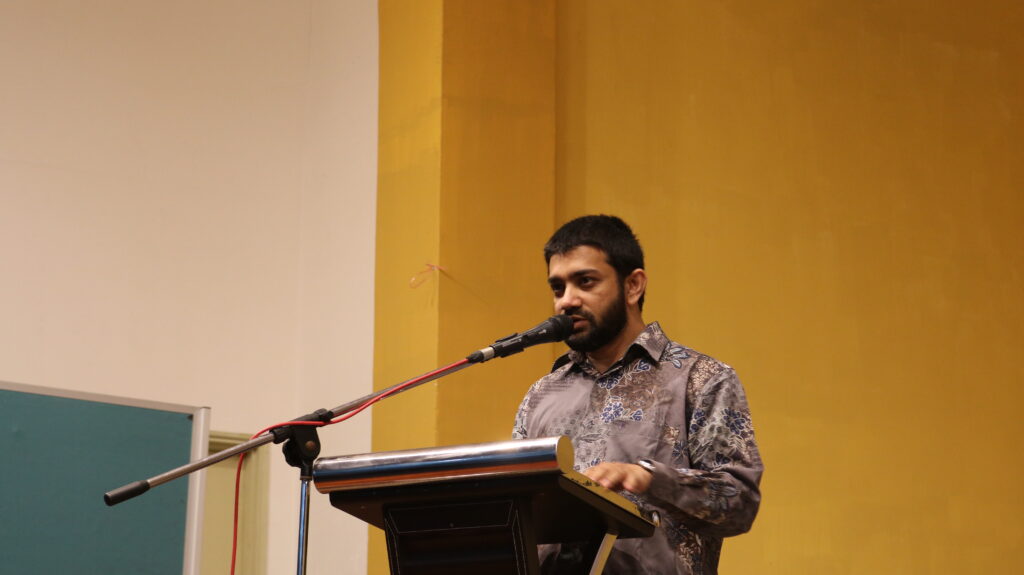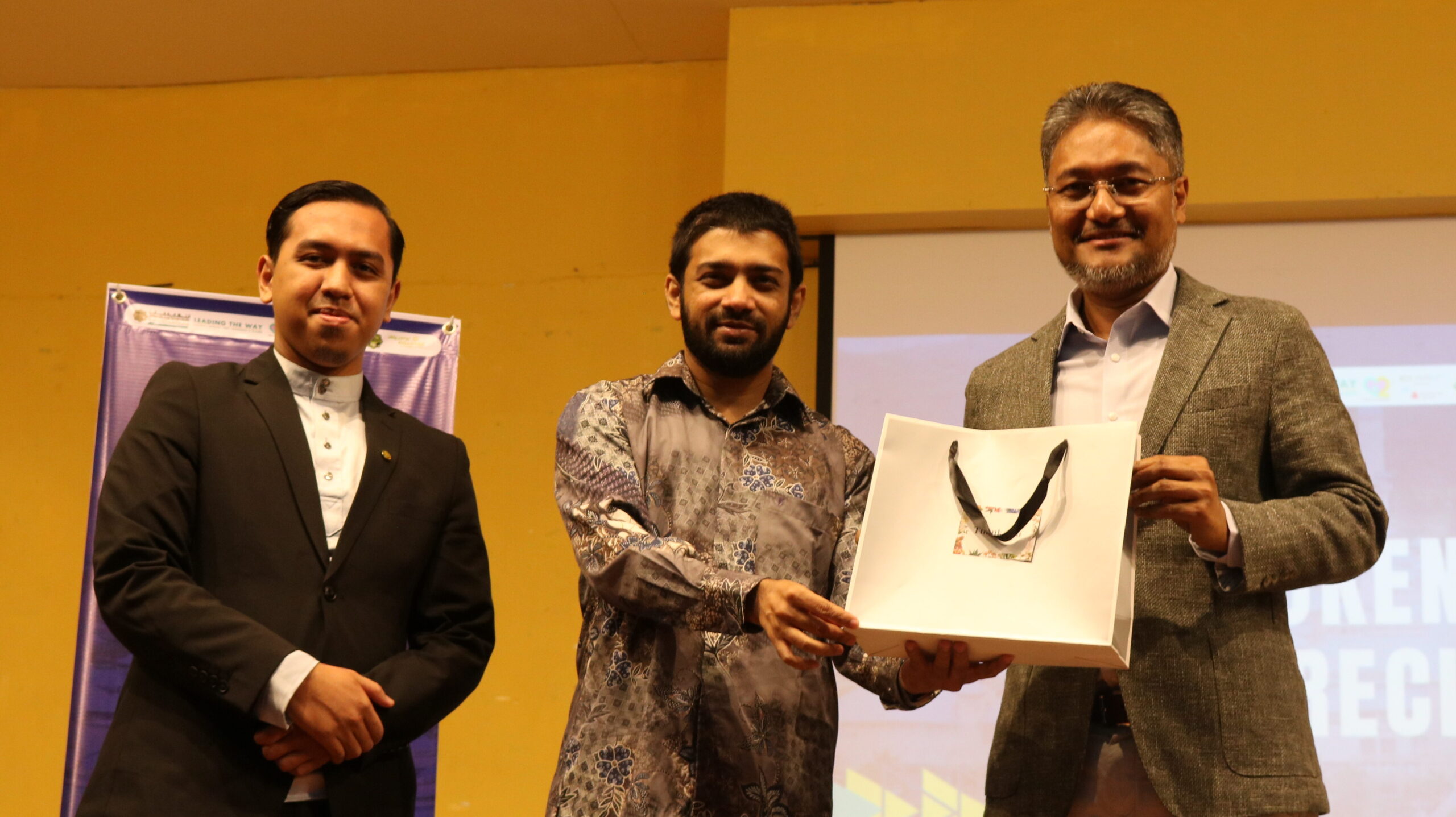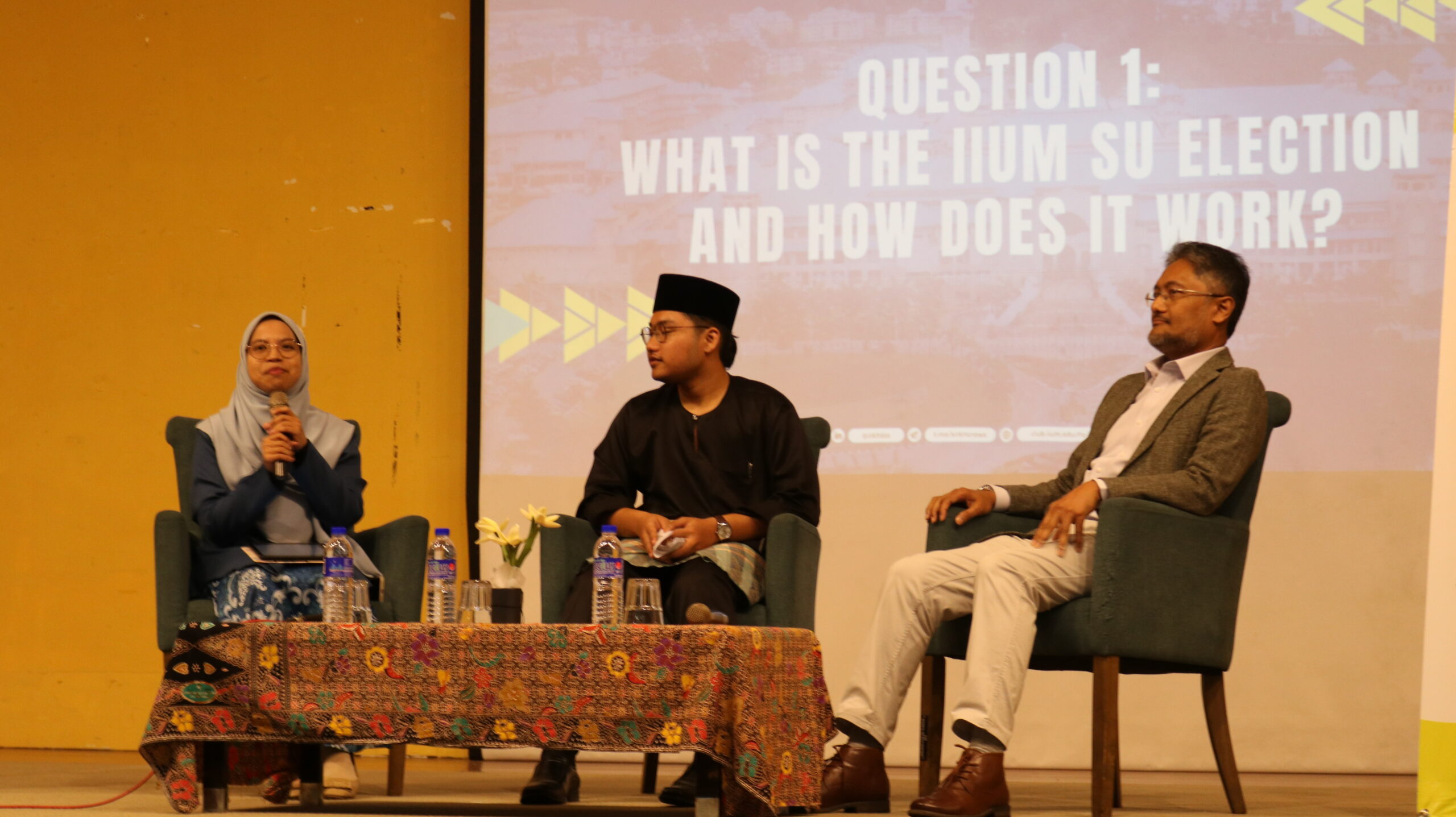By Husna Fathiyyah
GOMBAK, 22 May 2024: In higher education, democracy is not an abstract concept that is only discussed in the field of humanities such as political science and communication. It is in fact practised in the real-life setting, giving students a platform to voice out their opinions, influence university policies as well as engage in governance related to the rights and wellbeing of a university’s most important stakeholder – students.
The campus political scenes used to be vibrant and refreshing due to the youngins’ enthusiasm and never-ending energy. However, the COVID-19 pandemic took over in 2020, forcing students to undergo online teaching and learning for two years. Four years post-COVID-19, the aftereffects of the pandemic on students have been multifaceted, including student participation in campus politics.
This declining shift is immensely palpable at the International Islamic University Malaysia (IIUM). IIUM’s biggest campus election for the positions in the highest student body, the IIUM Student Union (IIUMSU), was scheduled on 7 May 2024. Despite the approaching election, there was a noticeably lack of open and lively discussions among students – a sign of the pervasive political apathy that several lecturers have noted among Gen-Z students.
In an effort to reignite political interest among students, the Islamic Revealed Knowledge and Human Sciences Students’ Society (IRKHSSS) organised a forum titled, “Democracy in Action: a Campus Perspective,” on 30 April 2024. IIUM Today was given the opportunity to attend the forum which was aligned with the campaigning period for all nominated candidates.
The forum session invited two prominent speakers in their own league, Associate Professor Datuk Dr. Marzuki Mohamad and Sr. Nurunnuha Daud binti Mohd Razali and moderated by Br. Muhammad Nadzmi Wajdi bin Yushadi, the Gombak Education officer of IIUMSU 23/24.
Associate Professor Datuk Dr. Marzuki, former Private Chief Secretary to Malaysia’s eighth Prime Minister, Tan Sri Muhyiddin Yassin brought a wealth of wisdom and political insight to the event after dabbling in the Malaysian political scene for more than a decade. Meanwhile, Sr. Nuha, is the first chairwoman of IIUMSU Election Commission (IIUMSU EC) since its establishment in 2020.
Campus Politics a Miniature of National Politics
Reminiscing his youth participating in campus politics, Associate Professor Datuk Dr. Marzuki, shed a light on the reality of the intensity of campus politics once upon a time, saying, “Campus politics is a miniature of national politics.” This is due to national political parties having affiliations with students, hence winning a campus election would signal the public’s interest in a specific political party.
He pointed out that campus politics is the entry point to be involved in the larger arena of national politics. The current national and political leaders in the country were once student leaders as well, and they brought up national concerns to the point of protesting and demonstrating in public. Following this notion, Associate Professor Datuk Dr. Marzuki stressed the importance for student leaders to voice out their concerns beyond the campus area.
“You are the voice of the people. It is okay to question about the quality of food (on campus)…to ask for better facilities…But don’t stop there,” he said.
“You see the students of Harvard university…voice out the concerns of the Palestinians. They talk about national issues…So for me, leaders of student societies should issue harsh statements on national issues,” he continued.

Manifesto or Quality?
In any election process, manifestos serve as a powerful tool to guide the voters in choosing their candidate for a specific position or constituency. Manifestos outline the candidates’ visions and promises to the public that they pledge to fulfil once elected. However, does the manifesto reign as the most important factor when choosing their candidates?
According to Associate Professor Datuk Dr. Marzuki, voters’ decision-making during the elections are guided by their ‘rational choice’. Following this, voters will elect their leaders according to two factors – the quality of the candidate and his or her manifesto.
In terms of quality, it is not rare for students to elect a candidate based on their friendship or popularity. Associate Professor Datuk Dr. Marzuki, said candidates can show their quality of leadership through campaign periods such as in the Speaker’s Corner. “If you are not able to speak well, then that is not a good quality…as you will be the voice of students,” he added.
However, candidates usually have similar traits and characteristics. “Outstanding” candidates are usually a rare case, hence the manifesto would then guide voters in the election more than ever. It is important for candidates to ensure that their manifesto is doable, as well as relatable to students’ issues on campus.
Muslim Student Leaders
One of the common scenes in national politics today is that misinformation and disinformation will be weaponised in the name of political strategy, hence Associate Professor Datuk Dr. Marzuki, advised against using such methods.
Associate Professor Datuk Dr. Marzuki emphasised on the importance of student leaders to be honest and truthful in their campaign strategies. “If you become a national leader one day, and you had used such (negative) methods when you were a student leader, could you reflect on your past and be proud of yourself?”
The student advisor of IRKHSSS, Dr. Mohammad Mohiuddin, also shared the same notion. In his opening speech for the event, while quoting a hadith on leadership, he reminded student leaders to follow Prophet Muhammad (peace be upon Him) for guidance in politics and governance.
“In Islam, there’s no superiority. Taqwa and piety should be the measurement to differentiate the level of taqwa and piety towards Allah. But we need to compete to receive the blessings from Allah,” he said.

The IIUMSU Electoral Process

Meanwhile, Sr. Nuha shed light on the electoral process for the upcoming IIUMSU election at the time. As an independent body, IIUMSU EC is responsible in managing and overseeing every inch of the electoral process, from issuing the notice of election, the nomination phase, the canvassing (campaigning) period and polling day. All of IIUMSU EC’s responsibilities are highlighted in their sacred document, “Election of IIUMSU Regulations 2020 (amended 2023)” which can be accessed on their official Instagram page.
According to Sr. Nuha, the document also outlines the qualification of candidacy for all interested students who wish to nominate themselves, in Rule 13. This includes maintaining a CGPA above 2.80 for normal seats, and not less than 3.00 for the president’s seat. Sr. Nuha also pointed out that the candidates will be vetted by OSEM, the Mahallah principal as well as the Deputy Dean.
“If the Deputy Dean feels like the student should focus more on studying instead of participating in the election, then the student will not be recommended to contest in the election,” mentioned Sr. Nuha.
For the voting process, all students are eligible to vote and it would be done through a Microsoft form, where students will be advised to ensure they have registered their official IIUM email addresses.
Pointing out that only two seats would be contested in the then tenure which are the seats for Vice President and Deputy President I, Sr. Nuha acknowledged the decline in students’ overall political involvement, inferring this as the aftereffects of COVID-19. She strongly urged students to participate in the IIUMSU election. “You are not just casting your vote. This is the beginning of your learning and understanding about democracy,” she said.
Hopes for the New Tenure

According to Br. Nik Muhammad Badrain bin Zamery, President of IRKHSSS, a Kulliyyah-based Society (KBS) and Mahallah Representative Coordination Council (MRCC) are the closest entities that manage students affairs, including academic and welfare. IRKHSSS is one of the KBS in IIUM, where its focus is in managing students’ academic affairs and welfare at the Kulliyyah level.
Br. Nik Muhammad highlighted that the IIUMSU election occurs annually in May, while the KBS elections are scheduled for December. This misalignment between the election cycles of these two major entities has been a contributing factor to the lack of coordination and relationship between them. Hence, Br. Nik Muhammad expressed his hope that the newly-elected IIUMSU leadership will work towards increasing their engagement and collaboration with KBS, fostering a more unified and effective student governance environment.
Although AHAS KIRKHS students had a turnout of 64 percent in the previous KBS election, Br. Nik Muhammad also acknowledged the low involvement of IIUM students in campus politics. Hence, he assured that IRKHSSS would do their best to increase students’ engagement campuswide by conducting relevant programmes.
“The forum is one example of our activities. We plan to organise another one in October for the upcoming KBS election,” said Br. Nik Muhammad. ***
(Disclaimer: By the time this article is written and published, the IIUMSU 2024 election concluded on 8 May 2024).
- Main driving force of 40th IIUM Convocation, Prof. Dr. Ahmad Faris, shares glimpses behind the scenes - November 22, 2024
- ‘The Muslim world needs leaders who can guide the next generation,’ says BOG Member Syed Ahsan at 40th IIUM Convocation - November 22, 2024
- BOG member, Dato’ Majit confers degrees upon 690 KAED, KOD and KSTCL graduands in 6th session of 40th IIUM Convocation - November 20, 2024
